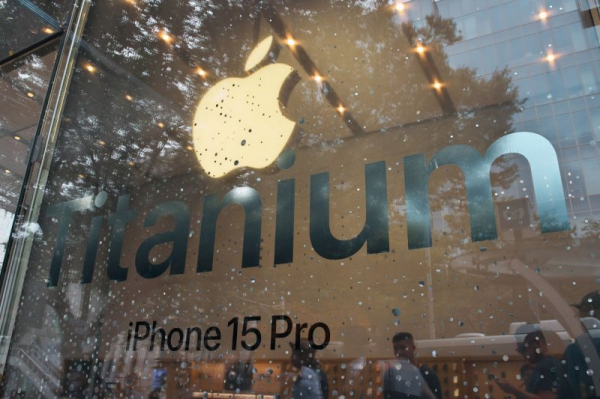
A British consumer advocacy group launched a $3.8 billion anti-trust class action against Apple on behalf of its 40 million United Kingdom customers alleging the U.S. tech giant is fleecing them by locking them in to its cloud storage ecosystem which comes with “rip off” charges. File Photo by Keizo Mori/UPI | License Photo
A British consumer advocacy group launched a $3.8 billion antitrust class action against Apple on behalf of its 40 million United Kingdom customers alleging the U.S. tech giant is fleecing them by locking them into its cloud storage ecosystem which comes with “rip off” charges.
The not-for-profit Which? said in a news release Wednesday it was seeking compensation for consumers from Apple for abusing the dominant position of its so-called “iCloud” data storage solution built into every one of its mobile-connected devices. Advertisement
“We believe that Apple breached competition law and it has cost U.K. consumers millions of pounds, so we are taking legal action against Apple to recover the overpayments made on iCloud services obtained on or after Oct. 1, 2015,” said Which? chief executive Anabel Hoult.
“By bringing this claim, Which? is showing big corporations like Apple that they cannot rip off U.K. consumers without facing repercussions. Taking this legal action means we can help consumers to get the redress that they are owed, deter similar behavior in the future and create a better, more competitive market.” Advertisement
Which? said its “opt-out” claim would argue that Apple violated British competition law by steering customers towards its proprietary iCloud service and by not clearly informing them of alternatives, or how to use them on its iOS devices.
“Which? believes that Apple iPhone and iPad iOS users have had little choice but to use Apple’s own iCloud service, and therefore Apple can charge users more than if it had to compete with rival cloud storage services,” it said.
The group added that the monthly charges for the service embedded into every Apple device, which range from $1.25 for 50GB of space to $69.46 for 12TB, are unfair because users aren’t offered alternatives.
“iPhone users are tied to iCloud because they cannot store or back up all of their phone’s data with a third-party provider, as Apple doesn’t allow certain data to be stored other than on iCloud,” said Which?
“The convenience of being ‘locked-in’ to this service over time could come at a significant cost — in terms of price, quality and choice. With Apple being such a dominant player in the phone and tablet market, this behavior also creates a barrier for any new cloud service providers.”
Which? said the ever-increasing volume of data generated by mobile and tablet users meant it was imperative that consumers were able to access competitive cloud storage alternatives on their devices. Advertisement
Eligible Apple customers, who would be automatically “opted in” unless they ask to be excluded, include any U.K. resident who “obtained iCloud services” on any device running iOS — iPhone, iPad, iPod Touch or any other Apple-supplied iOS-powered mobile device — since the Consumer Rights Act became law in fall 2015.
A specialist judicial body called the Competition Appeal Tribunal will have to give the green light for the case to proceed, however, Which? said it would drop its claim at any time if Apple “did the right thing” and refunded customers and opened up iCloud to allow users a real choice.
Apple said the allegations were untrue and that it would fight the suit.
“We reject any suggestion that our iCloud practices are anti-competitive and will vigorously defend against any legal claim otherwise,” the company said in a statement.
“Our users are not required to use iCloud, and many rely on a wide range of third-party alternatives for data storage. In addition, we work hard to make data transfer as easy as possible — whether it’s to iCloud or another service.
Apple also pointed out that prices of the other cloud storage providers used by many of its customers were broadly comparable to iCloud and that almost half of Apple customers did not subscribe to the paid-for option because they did not require additional storage, or did not want the additional cost. Advertisement
The Which? action comes alongside a similar $1.9 billion “abuse of dominance” claim dating back to 2021 alleging 19.6 million Brits were overcharged for app purchases with a one-day pre-trial review due to be held in London on Friday after the CAT ruled last week that the case against Apple Inc. and Apple Distribution International could proceed.
The trial itself is scheduled to open Jan. 13 and last for seven weeks.
Brought by King’s College academic Rachael Kent under the 1998 Competition Act prohibiting abuse of a dominant position, the proposed collective proceedings combine standalone claims against Apple Inc. and Apple Distribution International for loss and damage caused by alleged breaches of statutory duty by infringing the Functioning of the European Union Treaty.
The CAT also has cases pending against Facebook, Google, Steam and major British cell phone service providers.
Commercial law specialist Toby Starr of Humphries Kerstetter told the BBC that the Which? suit was yet another case among a “growing tide of large class actions against Big Tech” which he said had until now “operated without sufficient constraint.”
“Although most of these claims are in their infancy and take a long time to resolve, there will be more decisions coming out over the next couple of years and there will be settlements — these will start to affect the tech giants’ businesses,” said Starr. Advertisement